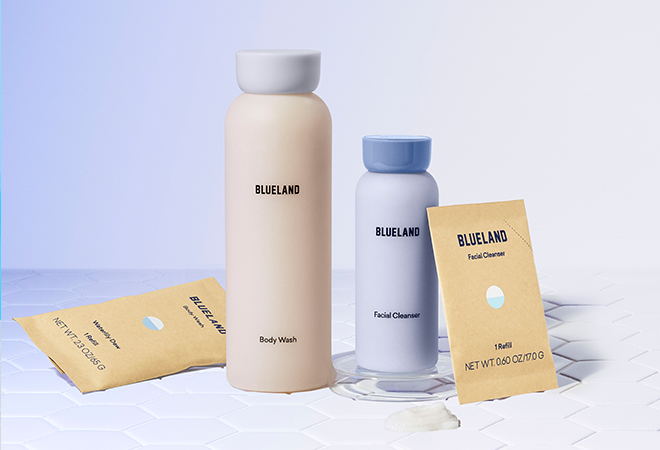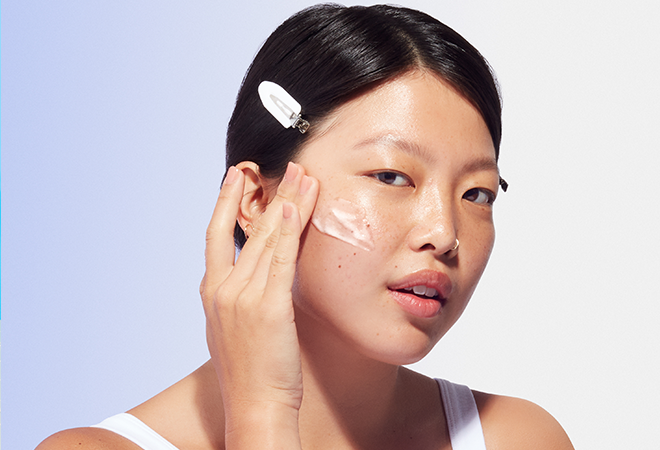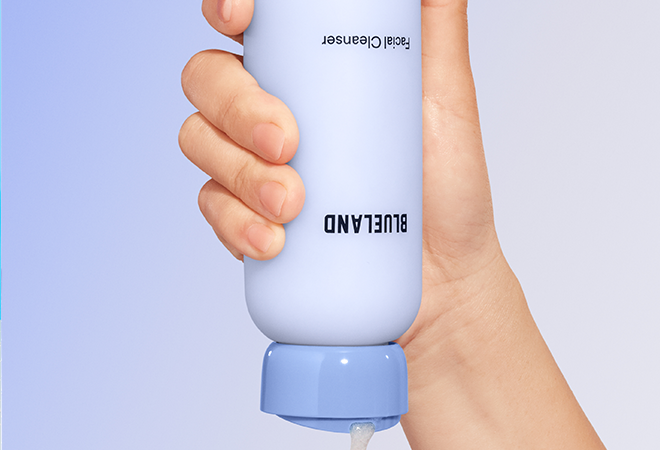Blueland struck (eco-friendly) gold with its refillable, plastic-free, and plant-based range of cleaning products, becoming the fastest-growing DTC brand, raising $20 million in investments from the likes of Able Partners, Comcast Ventures, Global Founders Capital, and Prelude Growth Partners.
The duo behind the company is a powerhouse of business and entrepreneurship. One half is former McKinsey & Co. business analyst, private equity associate, co-founder of mobile shopping platform Snapette, and founding partner of start-up studio Launch Sarah Paiji Yoo. The other is John Mascari, a mergers and acquisition analyst for Lehman Brothers and Barclays, who contributed his insights to The Wall Street Journal, and became founder of motherhood-focused F&D brand Bundle Organics.
Together, the two overhauled products such as dishwashing liquid, hand soap, and laundry detergent with a refill tablet format, available in Forever Bottles made of Tritan or glass, silicone Forever Shakers, or steel Forever Tins. The formulas themselves are free of parabens, phthalates, ammonia, VOCs, phosphates, and chlorine bleach, with vegan, gluten-free, soy- and nut-free ingredients that are Cradle to Cradle and Leaping Bunny Certified. Consumers simply need to add the tablet (or powder) to H2O for it to work its magic, also reducing company water production needs in the process.
The company is Climate Neutral Certified, using no single-use plastic and instead relying on recyclable shipping boxes, paper-based tape, compostable refill packaging, and water-based ink. The B Corp company also supports initiatives such as DigDeep, American Civil Liberties Union (ACLU), Natural Resources Defense Council (NRDC), and Lonely Whale. To date, Blueland has eliminated over 1 billion single-use plastic bottles, and given that 40% of overall plastic waste created is through packaging, that positive impact is rising by the day.
Now, the brand has turned its efforts towards skin and body care, with the introduction of a powder-to-gel Body Wash in May and the launch of their patent-pending Facial Cleanser this month. The latter Made Safe formula is a hypoallergenic, fragrance-free, and skin pH-balanced powder formula that turns into a non-foaming gel, plus contains gentle ingredients such as oat, kaolin clay, and vitamin E.
Furthermore, looking at impact beyond the solo company echo chamber, Bluleland has introduced Beyond the Bottle, a Twitter-based initiative to help consumers best recycle their products (no matter which brand they bought from). Users only need to tweet @blueland with a picture and name of their product, plus location, and the company will reply with the suitable end life (trash, partially recyclable, fully recyclable).
BeautyMatter spoke to Yoo about Blueland’s upward trajectory and expansion into personal care, and why she prioritizes need over new product development.
What prompted expanding into the skincare realm and the launch of Beyond the Bottle? Why was it important to have that tool available to consumers?
It's a really exciting moment for us to launch a facial cleanser and continue to move into beauty. From a mission perspective, that prospect has always been exciting for us. We're so proud of how we've moved the industry forward on the cleaning side. When we started, refillable cleaning products, using the same bottle over and over again, selling cleaning concentrates where you add your own water, that was an unheard-of behavior in the cleaning retail space. Certainly you had a subset of people that were making their own cleaners, but the vast majority of cleaners that were available in retail stores were for single-use consumption. Today, if you walk into any mass retailer, you'll see that all of the major CPG brands have their answer to refills and concentrate, which is really exciting.
Beauty has been another industry that we've been dying to dip our toe into. Obviously it's a massive industry and it feels like there are so many new products being released into the world at an increasingly faster clip. There's so much consumption and it's only accelerating. Beauty has always been interesting to me because the packaging in the beauty industry is notoriously unclear in terms of not just how to responsibly dispose of or recycle, but even labeling for the consumer what material you're purchasing.
As a consumer when you purchase a product, you're not just buying what's on the inside. You're purchasing that packaging as well. It's interesting coming from the cleaning industry where, with all the areas of improvements that remain, packaging labeling actually is very pervasive. The vast majority of cleaning products, if you pick it up off the shelf and look under, they'll usually tell you what material the product is, or at least the plastic number 1-7. In beauty, that definitely is not the case. I’m feeling very energized about entering beauty, seeing if we can help move the industry forward in that perspective.
Obviously the business model being built on refillable and these Forever Bottles, you have a mix of packaging. I feel like a lot of times people assume if you're doing that format it has to be glass, so I'm wondering what was the decision for using certain materials for one product versus another?
We've really thought more broadly than just plastic. For example, across all our operations since the beginning, we've worked very closely with Cradle to Cradle to assess every single ingredient and material we use at the molecular level, but also looking beyond plastic use into carbon emissions, water stewardship, energy consumption, etc. Similarly, when we thought about our bottles, we didn't want to assume that a material like glass was going to be the best path forward for us. It was going to be how we unlock the most impact, and so we did a lot of work to understand what consumers wanted and what was standing in their way to make more conscious, sustainable choices.
When we came into the space, Blueland was very much focused on how we turn a lot of the stereotypes of eco on its head. Eco had this bad reputation of being more expensive, less effective, and more work. That's what's prevented more sustainable products from reaching the mass market. We were really surprised that over 75% of consumers told us they would not use the product if it was a glass bottle, that they found it inconvenient, heavy, and that they're breaking, especially the spray bottles. We did not want those to be the reasons why people were turned off from converting to a reasonable system, which we ultimately do believe is so much better and simple to use.
Are there any challenges around hygiene when it comes to the refillable aspect?
It's a good question. That is part of what took us so long to bring our products to market, and it is a real differentiator of our product versus some others on the market. When we launched with the hand soap tablet, something that truly had never existed in the world before, much less a hand soap concentrate of any kind where you added water, the tricky thing that we needed to tackle there was that we now have people making it in their own homes. I may change my son's diaper and then decide to make the glass and mirror cleaner, I may not wash my hands in between and then I drop that tablet into the water. Then that mixture may be sitting under my sink for three years. Without a preservative system, something will start growing in that bottle within the first month. Creating a preservative system that was biodegradable, that was safe for the planet and families, that came in a dry format—all of those things were hard hurdles when we were getting started. It was not clear that we would be able to overcome that.
When it comes to recycling and reducing waste, it is this complex interconnected system. How much of the onus is on brands, on the infrastructure to provide proper recycling facilities, and how much of it is on the consumer? As a brand you can put in all this effort into making everything recyclable, biodegradable, compostable—if the consumer is just throwing it in the trash, all that effort goes to waste, right? Do you have any thoughts on where the biggest point of impact is there?
Blueland is a for-profit business, but I do feel strongly that in that triad of consumers, government, and businesses, that businesses should hold the responsibility. It’s hard, one con to capitalism is that natural resources are treated as infinite and free. Those externalities aren't priced, so when a business makes a decision to use a cheaper material that's not recyclable, that's using more resources of a product that may pollute more to create that material, their only incentive is to focus on the costs of that material to them. There's other things like pollution, carbon emissions, it being difficult to recycle, it going to the landfill, that they're not charged for.
In many ways, it does drive perverse incentives for businesses oftentimes to not care as much about the implications of the ingredients and materials that they use. I firmly believe that can't be the case. My journey to Blueland started when I became a new mom and started to understand how things were all connected and how now plastic is showing up in our food and water. For the past four-plus years, my family has been living a very low-waste lifestyle. In that I realized as a consumer I was so well intentioned, but in so many ways, we don't have a choice. By the time you go to that store shelf, almost everything is still coming packaged in plastic. If we want to drive meaningful change, those decisions will have to come at the business level. In Europe, there's a very different system. A lot of the countries have an extended producer responsibility, where, as a company, if you choose to put a lower-quality, less good-for-the-planet material out into the world, you have to pay an additional tax to cover the costs that then our society, governments, and taxpayers, who would otherwise foot the bill, are dealing with: that trash or recycling that hard-to-recycle material. I would like to believe businesses will start stepping up. We've made so many good strides in the past few years, and I am really hopeful that we'll continue in that direction.



What growth numbers have you had since starting with this surge of growth and investor interest? How has it been scaling and evolving the business?
We have been so fortunate to see a lot of growth in our business. We launched in the middle of 2019. We realize how lucky we were as a business because COVID was a windfall that no one expected. We started in cleaning products because it was a low-interest category, people didn't care as passionately about what cleaning products they use. It was an opportunity to push them into something better. It would have been hard to start in toothpaste, shampoo, or deodorant, [where] people had much stronger affinities or preferences for brands. But even prior to COVID, when we launched, we were flooded with support, and that's where we were like, “Okay, something's different.” The consumer is evolving, especially the younger consumer. There is something remarkably different about Gen Z that, again, also makes me very hopeful about our future. Gen Z are so much more intentional and conscious about what they consume and what brands they consume with. Right out the gate, we saw so much organic support, and then obviously COVID hit and that also was wind at our backs, enabled us in our first two years. We grew over 400% from just that first year.
Now entering a new category with skincare, what market opportunity are you seeing there?
There's a lot of opportunity there as well. Now we have 13 core products. We launched with cleaning sprays, now we're in dish, laundry, toilet, body wash. Any time we launch a new product, we do see our existing customer base very much still there. We see a huge, huge adoption rate of the new product we launch, which makes sense. If people came into the first product they purchased with Blueland for the mission, it makes sense that as we launch additional products, that same desire to lead a more conscious lifestyle would lead them to purchase our other products. Offering body washes and face washes will also enable us to reach a younger, Gen Z consumer who I just love and respect so much. We've always recognized that cleaning products are a very different target customer.
What are your future-facing plans?
In the future we're committed to innovation. We still have a robust innovation pipeline, we want to be thoughtful, though. We're very conscious internally about what we're putting out into the world. One of the reasons why we started in the categories we started with is to only sell things that we really felt people needed. Everyone has to wash their bodies and wash their dishes, and we want to stay in that space. We want to make sure we stay true to that mission. We're also in a lot of massive categories as it is. Laundry alone is a $50 billion+ industry. Another reason we want to make sure that we're focused on our core products—and being a relatively new brand there's definitely no shortage of opportunity—is to drive new customer adoption, meet people, and convert them to a refillable model. Innovation is at the top of my mind, but the bar is really high.